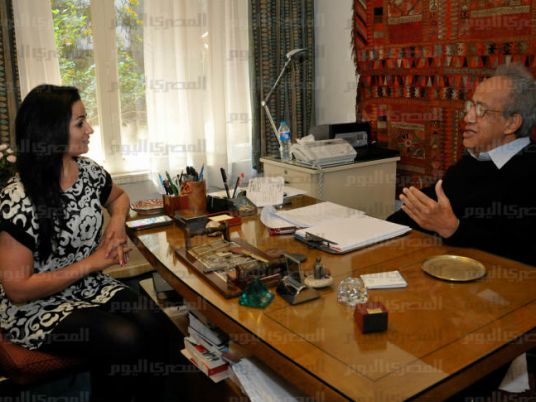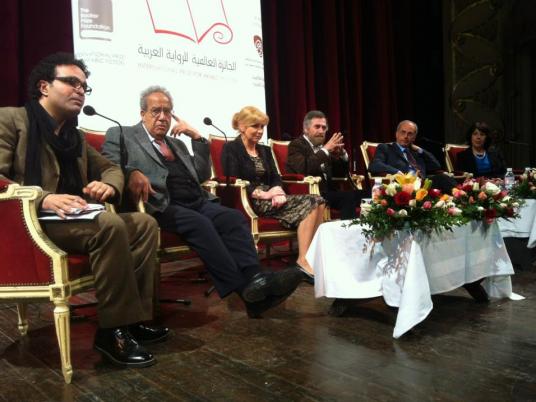
Contradicting current economic theories, Galal Amin, professor of economics at the American University in Cairo, spoke in an interview with Al-Masry Al-Youm about a need to expand the public sector, and warned of privatizing public services. He also said the government promises to support the low-income, but actually does the contrary.
He said that Sisi’s speeches have not yet turned into actions, and that the economic conference was more of a celebration, adding that any investment plans should have been presented to the people before being presented at the conference.
He added that social reform cannot be achieved by laws, but rather by reforming the economy, contending that there is a tacit trend to pamper the capitalist.
He also said that renewing religious discourse is a waste of time in a country that is hungry.
Q: What happened to the Egyptians after the January 25 and June 30 revolutions?
A: Those who made the French and the Bolshevik revolutions ruled their countries, but when we made the January revolution, others ruled us because the suggestion of forming a presidential council of four officers from the armed forces and from civilians was rejected.
Then there was no economic reform nor quasi-political reform. People lost confidence and gave up hope. The situation has severely deteriorated in all aspects of life.
Q: Will there be a breakthrough after the deterioration?
A: God knows.
Q: Some claim the wrong behavior of the Egyptians impedes all development?
A: This is provocative. There is wrong behavior because there has not been any development or equal opportunities for decades, and there has been injustice and corruption. The government is responsible for reform in the worst of circumstances, even if people behave in a barbaric way. If the government does not like it, perhaps it should look for other people to govern.
Q: There is talk about about renewing the religious discourse, with the Al-Azhar and the intellectuals engaging in battles over it. What do you make of that?
A: When the economy is doing bad, and when there is injustice, people appear on satellite channels to talk nonsense and incite battles just for attention.
Changing thoughts cannot be achieved by sermons. They will never change people’s behavior. How can you change the mentality of the teacher who cut the hair of a school girl because she was not wearing a headscarf? We should have either increased her salary or expelled her from work.
Before talking about renewing the religious discourse we have to change the state of anger, hatred and hopelessness that the people feel. We must improve their economic conditions for them to accept such talk.
Renewing the religious discourse in a country that is hungry is a waste of time. The problem is not in revising the curricula of the Al-Azhar or the Education Ministry, but in improving the miserable conditions of the teachers.
The poor have a deeper understanding of religion than the middle class, which is complicated and envies the rich. Extremism has come from the middle class.
Q: But hasn't the middle class kept the balance of the Egyptian society for many years?
A: Only until the 1960s. But starting with Sadat and his open door policy, a new middle class suddenly emerged from the corruption that was prevailing. Not having the education, it created an imbalance in the true nature and ethics of a real middle class.
Q: Talking about corruption, why is it rising although we have many supervisory bodies?
A: Corruption spreads when there is injustice and inflation, while wages are the same. An idle public servant, a teacher who gives private lessons and an employee who takes bribes are all examples of corruption. They are the product of their difficult conditions.
Add to it the absence of development and law enforcement. Supervisory bodies may treat the surface, but not the core. Social reform cannot be achieved with laws, but rather with improving the economy, which takes a long time.
Once people start feeling an improvement in their economic conditions, their behavior will change. That feeling was present after the 1952 and the January 2011 revolutions. But people soon lost hope when they sensed that the officials did not have the desire to reform.
Q: Do you think the government has an economic reform plan to achieve development?
A: Absolutely not. I have not seen or heard of any such plan. The statements of the officials prove that there is no such plan. For example, the government comes up with a statement saying it is targeting an economic growth rate of 7 percent over five years, but does not explain how this would be achieved.
Also, the government says it will help low-income social brackets, but then it reduces subsidies of basic commodities without raising wages.
Q: But does not President Sisi always say in his speeches that low-income brackets are a priority?
A: Unfortunately, his speeches have not been translated into actions. Most presidents do not know much about the economy, but many of them have good advisers.
Q: Do we not have an economic advisory council helping the president?
A: Most of the economists who are hired are either unable or unwilling to develop a plan. There are many who can, but they have never been called to help at any time.
Q: Are we unable to plan or to implement plans?
A: I propose to dissolve the Planning Ministry and the National Planning Institute. They have an army of ministers and under secretaries that cost the state money and do nothing.
Q: Does the government favor the capitalists?
A: I believe there is a trend to pamper the capitalists. Proof of it is the intention to privatize public hospitals and cancel free education.
Q: Some claim the public sector should be privatized because the government is a lousy manager. What do you think of that?
A: This is totally unacceptable. We heard such talk during Sadat’s open door policy. Those chanting these words are the ones who benefit personally from privatization, whether foreigners or Egyptians.
You can fix a lousy management by changing it or by improving the system with reward and punishment, not by selling the whole sector.
The poor have nowhere else to go except to the public hospitals. There are great doctors in the Kasr Al-Ainy Hospital that make operations for everyday free.
Q: But isn’t the public sector full of problems?
A: We should not generalize. The problems of each public sector company should be examined separately and resolved. I do not mean to say that the private sector should be omitted. To the contrary, it should be better treated than how it was in the 1960s.
Q: Should the public sector be expanded?
A: Yes, but managed better. Mind you, the public sector saved Egypt throughout periods of political and economic instability.
Q: But has it not disappeared in most countries of the world?
A: The free market is an elastic and unclear term. China applies a free market, but with a strong and dominant state control. Germany rose on the shoulders of the state protecting its national industry. So did the United States when it protected its industry from a European invasion. This is what we need to do in Egypt.
Q: What about imposing restrictions on the import of certain goods to protect the national industry?
A: The Free Trade Agreement was created so that weak countries, which are a market for the products of the superpowers, do not dare protect their national industries.
Q: So what can we do to protect our national industry without breaching international agreements?
A: We can make use of certain provisions of the World Trade Organization Agreement that give countries rights to protect their national industries in specific cases.
Q: But would this eliminate competition and lead to a low quality production of goods?
A: I agree that the presence of foreign products on the market could be an incentive for improving local products, but it could also eliminate them altogether. There are brands that have vanished completely when their competitive foreign counterparts were introduced to the market.
Q: What do you think of the economic conference?
A: Frankly, it was more of a celebration than a conference. Many people were invited to it although that have nothing to do with the economy, while others who are experts were not.
The planning minister did not present a detailed plan for economic projects. He should have presented an investment plan to the people before talking about it at the conference.
Q: What do you think of the new administrative capital project?
A: It will not solve the problems of the old capital. I do not think that our problems are so huge that we need to build a new capital. There are other less expensive ways.
Q: But why is is a bad project?
A: Because it will cost a bundle. It will need infrastructure that many parts of the old capital are deprived of. Maybe it is better to improve the existing infrastructure of the old capital first.
I am not against the project, but economics is the science of priorities. We need factories, land reclamation, transportation and other important facilities for this capital instead of luxury apartments and golf courses for the new capital that would be inhabited only by the rich.
Since Sadat, the government has been focusing on a real estate development and not an economic development as such. Sadat’s notion of development was high-priced apartments. That is why he built satellite cities. And Mubarak’s notion was villas and palaces in the North Coast and Sharm El-Sheikh.
Q: Presidents like to adopt national projects to immortalize their names. What projects should we adopt to advance?
A: Useful projects. The High Dam was a useful project, but Toshka was not. It only cost us billions of pounds. Eliminating literacy is a useful project. It can be done in five years. Small projects can be more useful than giant project that cost a lot.
Q: Why is the informal economy growing in Egypt?
A: Because people need to eat and feed their children. They will do anything for this. We should integrate the informal economy into the formal. We should help it grow. We should allow it credit facilities from the banks rather than just tax it because it constitutes 50 percent of the total economy.
Q: Does the government know the difference between economic development and the development of the productive capacity and the national income?
A: Economists know the difference well. But in order to move from simply increasing income to a real economic development we must have the intention and the sovereignty to take sound decisions for the general interest, not for personal interests.
Edited translation from Al-Masry Al-Youm

